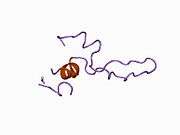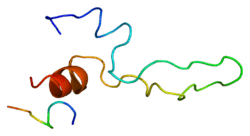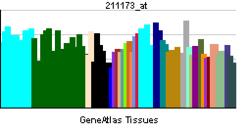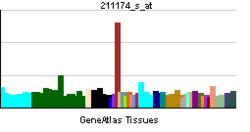Cholecystokinin A receptor
| View/Edit Human | View/Edit Mouse |
| Cholecystokinin A receptor, N-terminal domain | |||||||||
|---|---|---|---|---|---|---|---|---|---|
 molecular complex of cholecystokinin-8 and n-terminus of the cholecystokinin a receptor by nmr spectroscopy | |||||||||
| Identifiers | |||||||||
| Symbol | CholecysA-Rec_N | ||||||||
| Pfam | PF09193 | ||||||||
| InterPro | IPR015276 | ||||||||
| SCOP | 1d6g | ||||||||
| SUPERFAMILY | 1d6g | ||||||||
| |||||||||
The Cholecystokinin A receptor is a human protein, also known as CCKAR or CCK1, with CCK1 now being the IUPHAR-recommended name.
Function
This gene encodes a G-protein coupled receptor that binds sulfated members of the cholecystokinin (CCK) family of peptide hormones. This receptor is a major physiologic mediator of pancreatic enzyme secretion and smooth muscle contraction of the gallbladder and stomach. In the central and peripheral nervous system this receptor regulates satiety and the release of beta-endorphin and dopamine.[4]
The extracellular, N-terminal, domain of this protein adopts a tertiary structure consisting of a few helical turns and a disulfide-cross linked loop. It is required for interaction of the cholecystokinin A receptor with its corresponding hormonal ligand.[5]
Selective Ligands
Agonists
- Cholecystokinin
- Gastrin
- CCK-4
- SR-146,131
- A-71623 - modified tetrapeptide, potent and selective CCKA agonist, IC50 3.7nM, 1200x selectivity over CCKB, CAS# 130408-77-4
Antagonists
- Proglumide
- Lorglumide
- Devazepide
- Dexloxiglumide
- Asperlicin
- SR-27897
- IQM-95333
- JNJ-17156516
See also
References
- ↑ "Drugs that physically interact with Cholecystokinin receptor type A view/edit references on wikidata".
- ↑ "Human PubMed Reference:".
- ↑ "Mouse PubMed Reference:".
- ↑ "Entrez Gene: CCKAR cholecystokinin A receptor".
- ↑ Pellegrini M, Mierke DF (Nov 1999). "Molecular complex of cholecystokinin-8 and N-terminus of the cholecystokinin A receptor by NMR spectroscopy". Biochemistry. 38 (45): 14775–83. doi:10.1021/bi991272l. PMID 10555959.
External links
- "Cholecystokinin Receptors: CCK1". IUPHAR Database of Receptors and Ion Channels. International Union of Basic and Clinical Pharmacology.
Further reading
- Varga G, Bálint A, Burghardt B, D'Amato M (Apr 2004). "Involvement of endogenous CCK and CCK1 receptors in colonic motor function". British Journal of Pharmacology. 141 (8): 1275–84. doi:10.1038/sj.bjp.0705769. PMC 1574909
 . PMID 15100163.
. PMID 15100163. - Wang J, Si YM, Liu ZL, Yu L (Jun 2003). "Cholecystokinin, cholecystokinin-A receptor and cholecystokinin-B receptor gene polymorphisms in Parkinson's disease". Pharmacogenetics. 13 (6): 365–9. doi:10.1097/00008571-200306000-00008. PMID 12777967.
- Miller LJ, Holicky EL, Ulrich CD, Wieben ED (Oct 1995). "Abnormal processing of the human cholecystokinin receptor gene in association with gallstones and obesity". Gastroenterology. 109 (4): 1375–80. doi:10.1016/0016-5085(95)90601-0. PMID 7557108.
- Huppi K, Siwarski D, Pisegna JR, Wank S (Feb 1995). "Chromosomal localization of the gastric and brain receptors for cholecystokinin (CCKAR and CCKBR) in human and mouse". Genomics. 25 (3): 727–9. doi:10.1016/0888-7543(95)80018-H. PMID 7759110.
- de Weerth A, Pisegna JR, Huppi K, Wank SA (Jul 1993). "Molecular cloning, functional expression and chromosomal localization of the human cholecystokinin type A receptor". Biochemical and Biophysical Research Communications. 194 (2): 811–8. doi:10.1006/bbrc.1993.1894. PMID 8343165.
- Ulrich CD, Ferber I, Holicky E, Hadac E, Buell G, Miller LJ (May 1993). "Molecular cloning and functional expression of the human gallbladder cholecystokinin A receptor". Biochemical and Biophysical Research Communications. 193 (1): 204–11. doi:10.1006/bbrc.1993.1610. PMID 8503909.
- Kennedy K, Gigoux V, Escrieut C, Maigret B, Martinez J, Moroder L, Fréhel D, Gully D, Vaysse N, Fourmy D (Jan 1997). "Identification of two amino acids of the human cholecystokinin-A receptor that interact with the N-terminal moiety of cholecystokinin". The Journal of Biological Chemistry. 272 (5): 2920–6. doi:10.1074/jbc.272.5.2920. PMID 9006937.
- Inoue H, Iannotti CA, Welling CM, Veile R, Donis-Keller H, Permutt MA (Jun 1997). "Human cholecystokinin type A receptor gene: cytogenetic localization, physical mapping, and identification of two missense variants in patients with obesity and non-insulin-dependent diabetes mellitus (NIDDM)". Genomics. 42 (2): 331–5. doi:10.1006/geno.1997.4749. PMID 9192855.
- Gigoux V, Escrieut C, Silvente-Poirot S, Maigret B, Gouilleux L, Fehrentz JA, Gully D, Moroder L, Vaysse N, Fourmy D (Jun 1998). "Met-195 of the cholecystokinin-A receptor interacts with the sulfated tyrosine of cholecystokinin and is crucial for receptor transition to high affinity state". The Journal of Biological Chemistry. 273 (23): 14380–6. doi:10.1074/jbc.273.23.14380. PMID 9603948.
- Funakoshi A, Fukamizu Y, Miyasaka K (2000). "Mechanism of cholecystokinin-A- receptor antagonist on human pancreatic exocrine secretion. Localization of CCK-A receptor in the human duodenum". Digestion. 60 Suppl 1: 75–80. doi:10.1159/000051459. PMID 10026437.
- Gigoux V, Escrieut C, Fehrentz JA, Poirot S, Maigret B, Moroder L, Gully D, Martinez J, Vaysse N, Fourmy D (Jul 1999). "Arginine 336 and asparagine 333 of the human cholecystokinin-A receptor binding site interact with the penultimate aspartic acid and the C-terminal amide of cholecystokinin". The Journal of Biological Chemistry. 274 (29): 20457–64. doi:10.1074/jbc.274.29.20457. PMID 10400673.
- Gigoux V, Maigret B, Escrieut C, Silvente-Poirot S, Bouisson M, Fehrentz JA, Moroder L, Gully D, Martinez J, Vaysse N, Fourmy AD (Nov 1999). "Arginine 197 of the cholecystokinin-A receptor binding site interacts with the sulfate of the peptide agonist cholecystokinin". Protein Science. 8 (11): 2347–54. doi:10.1110/ps.8.11.2347. PMC 2144185
 . PMID 10595537.
. PMID 10595537. - Funakoshi A, Miyasaka K, Matsumoto H, Yamamori S, Takiguchi S, Kataoka K, Takata Y, Matsusue K, Kono A, Shimokata H (Jan 2000). "Gene structure of human cholecystokinin (CCK) type-A receptor: body fat content is related to CCK type-A receptor gene promoter polymorphism". FEBS Letters. 466 (2-3): 264–6. doi:10.1016/S0014-5793(00)01080-2. PMID 10682840.
- Tachikawa H, Harada S, Kawanishi Y, Okubo T, Shiraishi H (Apr 2000). "Novel polymorphisms of the human cholecystokinin A receptor gene: an association analysis with schizophrenia". American Journal of Medical Genetics. 96 (2): 141–5. doi:10.1002/(SICI)1096-8628(20000403)96:2<141::AID-AJMG3>3.0.CO;2-R. PMID 10893485.
- Giragossian C, Mierke DF (Apr 2001). "Intermolecular interactions between cholecystokinin-8 and the third extracellular loop of the cholecystokinin A receptor". Biochemistry. 40 (13): 3804–9. doi:10.1021/bi002659n. PMID 11300760.
- Schmitz F, Schrader H, Otte J, Schmitz H, Stüber E, Herzig K, Schmidt WE (Sep 2001). "Identification of CCK-B/gastrin receptor splice variants in human peripheral blood mononuclear cells". Regulatory Peptides. 101 (1-3): 25–33. doi:10.1016/S0167-0115(01)00281-6. PMID 11495676.
- Tachikawa H, Harada S, Kawanishi Y, Okubo T, Suzuki T (Sep 2001). "Linked polymorphisms (-333G>T and -286A>G) in the promoter region of the CCK-A receptor gene may be associated with schizophrenia". Psychiatry Research. 103 (2-3): 147–55. doi:10.1016/S0165-1781(01)00276-1. PMID 11549403.
- Schmitz F, Göke MN, Otte JM, Schrader H, Reimann B, Kruse ML, Siegel EG, Peters J, Herzig KH, Fölsch UR, Schmidt WE (Dec 2001). "Cellular expression of CCK-A and CCK-B/gastrin receptors in human gastric mucosa". Regulatory Peptides. 102 (2-3): 101–10. doi:10.1016/S0167-0115(01)00307-X. PMID 11730982.
- Okubo T, Harada S, Higuchi S, Matsushita S (Aug 2002). "Investigation of quantitative trait loci in the CCKAR gene with susceptibility to alcoholism". Alcoholism, Clinical and Experimental Research. 26 (8 Suppl): 2S–5S. doi:10.1097/01.ALC.0000026826.96191.FB. PMID 12198366.
- Takata Y, Takeda S, Kawanami T, Takiguchi S, Yoshida Y, Miyasaka K, Funakoshi A (2003). "Promoter analysis of human cholecystokinin type-A receptor gene". Journal of Gastroenterology. 37 (10): 815–20. doi:10.1007/s005350200135. PMID 12424565.
This article incorporates text from the United States National Library of Medicine, which is in the public domain.
This article incorporates text from the public domain Pfam and InterPro IPR015276


